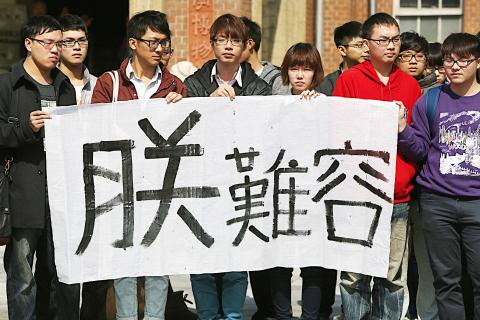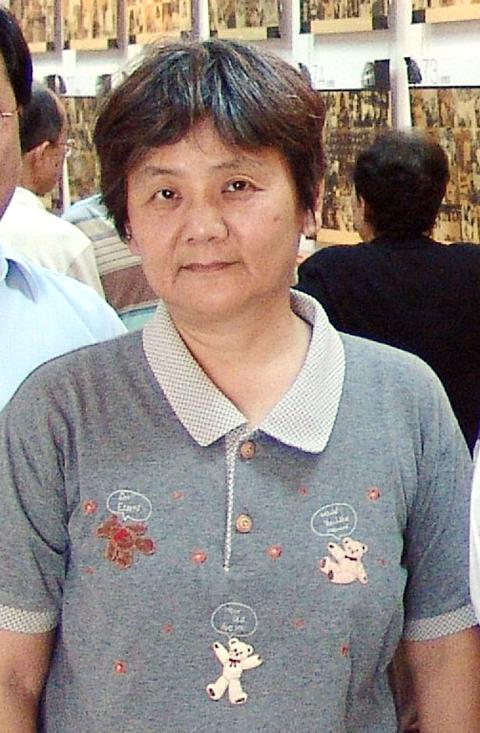History professor Wang Wen-hsia (王文霞) at National Cheng Kung University (NCKU) yesterday apologized for her remarks this week about the late activist Deng Nan-jung (鄭南榕), but that did not stop academics and students from urging the university to name a plaza on its campus after the democracy pioneer, as students had voted to do.
In a statement issued via the school, Wang apologized twice for not being able to make herself clear on Tuesday when expressing her opposition to the plaza being named “Nan-jung Square” (South Banyan Square, 南榕廣場), “due to time constraints” and for “disturbances caused to society” by the remarks.
“I did not say that Deng Nan-jung was a terrorist. The analogy [between Deng Nan-jung and] Islamist bombers was drawn when I was talking about how people deal with problems in life,” Wang said in her statement.

Photo: CNA
Wang said she meant to say young people must work hard and treasure life when facing hardship, since “I do not approve of coping with life’s challenges in such a radical way.”
The professor, specializing in 19th century and 20th century European history, said she held Deng and many other people in very high regard for their various contributions to Taiwan’s democratic development and had no intention to vilify Deng.
Wang said she did not look at the “political dimensions” of Deng’s self-immolation, but examined them from the perspectives of “education” and “respect for life.”

Screen grab from National Cheng Kung University’s Web site
“Mr Deng has an assured place in the history of Taiwan’s democratic movement. I didn’t have any intention to deny his contribution at all,” she said.
In a second statement, Wang said she sincerely apologized to Deng Nan-jung’s widow, Yeh Chu-lan (葉菊蘭), and daughter, Deng Chu-mei (鄭竹梅).
Wang said her remarks have hurt them.
At Tuesday’s meeting of the university’s School Affairs Committee, student and teacher representatives voted 70-21 in favor of not naming the plaza at all, overruling a vote in November last year in which 3,500 students, faculty members and staff chose to name it “Nan-jung Square” in honor of Deng Nan-jung, who set himself alight on April 7, 1989, in defense of freedom of expression.
Wang’s denials about the analogy of Islamic bombers and the way she perceived Deng Nan-jung’s contribution to Taiwan’s democratization process were contradicted by the transcript of her remarks provided by a student club, 02 Group (零二社).
The transcript, along with a video recording of Wang’s remarks, was uploaded online.
Later yesterday, Deng Chu-mei issued a statement in response to Wang’s statements.
The 34-year-old said her father had been a person who had respect for life, loved life and was enthusiastic about life.
“We enjoyed reading Doraemon whenever there was a new edition and were eager to find out what kinds of gadgets Doraemon pulled from its pocket. We often went to a book rental store picking up novels by [Japanese novelist] Jiro Akagawa,” she said.
Deng Chu-mei said that while her father never taught her how to deal with life’s challenges, he had encouraged her to think independently.
“We live on the same island. We need to understand each other better, so we can have a better future. It’s nothing but politics to look at life and history, not a political dimension,” Deng Chu-mei said.
“No matter what the plaza is named or whether it is not named, what they say or do along the way is a challenge for everyone,” she said.
She invited Wang, members of the School Affairs Committee, historians, education workers and people interested in related issues to visit the Deng Liberty Foundation to exchange views.
“Life is precious, we shall never give it up easily. Neither did my father,” she said.
Earlier yesterday, a group of students from several of the university’s students clubs issued a joint statement saying they would have a ceremony to formally name the plaza “Nan-jung Square” when the new semester begins.
More than 200 students yesterday staged a really on campus, demanding an apology from National Cheng Kung University President Hwung Hwung-hweng (黃煌煇).
They said the executives of the school lacked the spirit of a university and democracy, and ridiculed the university’s arbitrary decision not to name the plaza by unfurling a white banner with text, a homophone to Deng’s name, reading: “The emperor finds it [the decision] intolerable (朕難容).”
Meanwhile, representatives of the Taiwan Association of University Professors and the Ding-nan Chen Education Foundation called a press conference in Taipei demanding that the school name the plaza Nan-jung Square in accordance with the November vote.
“The naming incident showed there is still a long way to go to achieve the goal Deng Nan-jung had pursued: 100 percent freedom of expression,” professor of history at Fu Jen University Chen Chun-kai (陳君愷) said.
“We miss him so much,” he added.

SECURITY: As China is ‘reshaping’ Hong Kong’s population, Taiwan must raise the eligibility threshold for applications from Hong Kongers, Chiu Chui-cheng said When Hong Kong and Macau citizens apply for residency in Taiwan, it would be under a new category that includes a “national security observation period,” Mainland Affairs Council (MAC) Minister Chiu Chui-cheng (邱垂正) said yesterday. President William Lai (賴清德) on March 13 announced 17 strategies to counter China’s aggression toward Taiwan, including incorporating national security considerations into the review process for residency applications from Hong Kong and Macau citizens. The situation in Hong Kong is constantly changing, Chiu said to media yesterday on the sidelines of the Taipei Technology Run hosted by the Taipei Neihu Technology Park Development Association. With

CARROT AND STICK: While unrelenting in its military threats, China attracted nearly 40,000 Taiwanese to over 400 business events last year Nearly 40,000 Taiwanese last year joined industry events in China, such as conferences and trade fairs, supported by the Chinese government, a study showed yesterday, as Beijing ramps up a charm offensive toward Taipei alongside military pressure. China has long taken a carrot-and-stick approach to Taiwan, threatening it with the prospect of military action while reaching out to those it believes are amenable to Beijing’s point of view. Taiwanese security officials are wary of what they see as Beijing’s influence campaigns to sway public opinion after Taipei and Beijing gradually resumed travel links halted by the COVID-19 pandemic, but the scale of

A US Marine Corps regiment equipped with Naval Strike Missiles (NSM) is set to participate in the upcoming Balikatan 25 exercise in the Luzon Strait, marking the system’s first-ever deployment in the Philippines. US and Philippine officials have separately confirmed that the Navy Marine Expeditionary Ship Interdiction System (NMESIS) — the mobile launch platform for the Naval Strike Missile — would take part in the joint exercise. The missiles are being deployed to “a strategic first island chain chokepoint” in the waters between Taiwan proper and the Philippines, US-based Naval News reported. “The Luzon Strait and Bashi Channel represent a critical access

Pope Francis is be laid to rest on Saturday after lying in state for three days in St Peter’s Basilica, where the faithful are expected to flock to pay their respects to history’s first Latin American pontiff. The cardinals met yesterday in the Vatican’s synod hall to chart the next steps before a conclave begins to choose Francis’ successor, as condolences poured in from around the world. According to current norms, the conclave must begin between May 5 and 10. The cardinals set the funeral for Saturday at 10am in St Peter’s Square, to be celebrated by the dean of the College